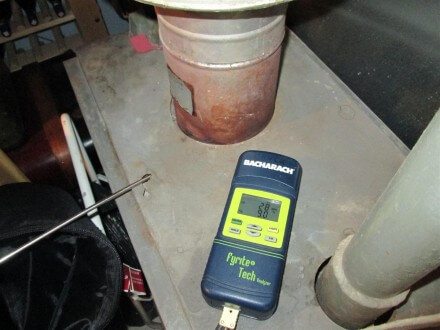In a recent blog post about fall maintenance for Minnesota homeowners, I recommended annual furnace inspections (or boiler inspections) by a professional HVAC contractor. One reader sent me an email many years ago asking if this was really necessary:
I have a question about furnace tune-ups. You say get one every year – is that really necessary? What do the HVAC guys actually do to the furnace to “tune” it up? There’s no spark plugs to replace like a car tune-up, and my understanding is they basically vacuum out dust and inspect it. Couldn’t the homeowner do this himself? Or do I really need to pay $80-150 bucks every year for a professional to do it?
I answered these questions on this blog many years ago, but I think this is a topic that’s worthy of a reminder.
Are annual furnace inspections really necessary?
Furnace manufacturers all recommend annual inspections and maintenance by a qualified technician. They also have language in their warranties saying that damage to the units caused by improper maintenance is not covered under warranty. Does this mean that an annual furnace check-up is really required, or the warranty is voided? Probably not, but it’s recommended. The best analogy I can think of is going to the dentist every six months for a check-up and cleaning; probably not necessary, but recommended.
I’ve heard some HVAC contractors recommend getting newer furnaces checked every other year, but once they’re over ten years old, have them checked annually.
What do HVAC technicians actually do to the furnace to “tune” it up?
It depends. According to Chris Jirak, a heating guru I know who has worked for several firms in the Twin Cities over a period of over 30 years, the service you get when you purchase a $29 pre-paid coupon is going to be quite different from a $200 “tune-up”. Chris said that every contractor he has ever worked for has had carefully worded language with subtle differences in the descriptions, making it nearly impossible to compare services between different heating companies. A few services you may have heard of are “safety check”, “certification”, “check-up”, “tune-up”, “basic tune-up”, “complete tune-up”, and “annual maintenance check-up.”
The services provided by different heating contractors will vary, depending on who you call and what you pay. For example, I once inspected a boiler in Minneapolis that had a missing flue cap at the exterior, an undersized vent connector, and a rust hole in the middle of the cabinet that was leaking carbon monoxide into the home.
Just a couple months prior to this, a heating contractor had come out to inspect the boiler and gave it a clean bill of health. The receipt for the service call had been left on the kitchen table, so I took a photo of it.
The point is that there seems to be no industry standard for a furnace (or boiler) tune-up, so what’s included in a “tune-up” will vary greatly from company to company. If you’re going to hire a heating contractor to do a tune-up on your furnace, ask them what they’ll be doing. Included below is a partial list of generic stuff that different furnace manufacturers recommend having performed annually a qualified heating technician:
- The vent system needs to be checked for blockage and/or leakage. This includes the outside termination and the connections at and internal to the furnace.
- Combustion gases must be analyzed and compared to the unit specifications.
- The blower access door needs to be checked to make sure it makes a tight seal at the furnace.
- The fresh air intake grills and louvers need to be checked for blockage.
- The heat exchanger needs to be inspected for rust and corrosion.
- The burners need to be checked for proper ignition, burner flame, and flame sense.
- The drainage system needs to be checked for blockage and/or leakage. This includes the hoses internal to the furnace. The condensate drain and trap need to be cleaned, and the water replaced in the trap.
- The blower wheel needs to be checked for debris and cleaned if necessary – this requires complete removal of the blower wheel.
- An amp-draw test should be conducted on the blower motor and compared with what is listed.
- The wiring needs to be checked for corrosion and damage.
- The filters need to be checked (but this needs to be done much more frequently than annually).
In addition to this list, heating contractors say that they regularly do static air pressure checks, gas pressure testing, and temperature rise checks.
Couldn’t the homeowner do this herself?
Of course… but the only homeowners I know who are knowledgeable enough to do all that stuff listed above also happen to be heating contractors. If the only thing your furnace tech does is stick a vacuum nozzle into the furnace and suck a little dust out of it, sure, do it yourself. If your furnace tech does half the stuff on the list above, they’re earning their keep.
Before you hire a company to do a tune-up on your furnace, ask what’s included. The company doing the work should be able to quickly rattle off a long list of stuff they’ll be checking. Centerpoint Energy is known for offering one of the least expensive furnace tune-ups out there, yet they have a nice list of stuff that says exactly what they do for the money right on their website.
Do I really need to pay $100 – $200 every year for a professional to do this?
In short, yes. This is what a professional charges – maybe even more. For most heating contractors, $100 barely covers the trip charge. Keep in mind, this isn’t just about safety; it’s also about preventative maintenance. It’s about sometimes catching a problem before your furnace quits working in the middle of the night. When you have to hire a heating contractor to show up on a Sunday evening because the furnace stopped working, you’re probably going to end up paying emergency rates.



